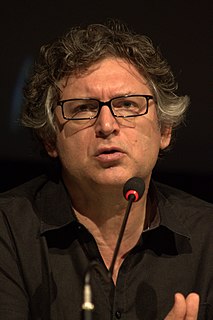A Quote by Philip Kitcher
I was occupied by a range of questions, often different from those fashionable in the professional philosophy of the past half century, that have sometimes troubled philosophers in the past. It's taken me several decades to work out my own philosophical agenda, and it is wide.
Related Quotes
Quite early on, and certainly since I started writing, I found that philosophical questions occupied me more than any other kind. I hadn't really thought of them as being philosophical questions, but one rapidly comes to an understanding that philosophy's only really about two questions: 'What is true?' and 'What is good?'
An imbecile habit has arisen in modern controversy of saying that such and such a creed can be held in one age but cannot be held in another. Some dogma, we are told, was credible in the twelfth century, but is not credible in the twentieth. You might as well say that a certain philosophy can be believed on Mondays, but cannot be believed on Tuesdays. You might as well say of a view of the cosmos that it was suitable to half-past three, but not suitable to half-past four. What a man can believe depends upon his philosophy, not upon the clock or the century.
One thing I really like about philosophy is that it's possible actually to do work in a wide range of different areas. I am particularly happy that I've even been able to do work in logic that has allowed me to use and develop my mathematical abilities, as well as to work on quite distant topics in philosophy of language and mind.
We're at a historical juncture: A growing number of people are declaring what has been achieved over the past decades in Europe to be wrong. They want to return to the nation-state. Sometimes there is even a blood and soil rhetoric that for me is starkly reminiscent of the interwar years of the past century, whose demons we are still all too familiar with.
The kind of approach I take is different from much of experimental philosophy. Although the experimental philosophers and I are certainly in agreement about the relevance of empirical work to philosophy, a good deal of their work is devoted to understanding features of our folk concepts, and in this respect, at least, I see them as making the same mistake as those armchair philosophers who are interested in conceptual analysis.
Actual philosophers... are commanders and law-givers: they say "thus it shall be!", it is they who determine the Wherefore and Whither of mankind, and they possess for this task the preliminary work of all the philosophical laborers, of all those who have subdued the past - they reach for the future with creative hand, and everything that is or has been becomes for them a means, an instrument, a hammer.
I think one reason is that philosophers are more insecure to speak accessibly because non-philosophers are skeptical that philosophers have any special expertise. After all, all people - not just philosophers - have attitudes and points of view on various philosophical questions, and they rather resent being told that there are professionals who can think about these things better.
Now, as at the beginning of the 19th century, there is a certain discovery of Eckhart and related figures. There are questions as to how far our Eckhart accords with the real medieval teacher of that name, but there are certainly images in his work that help us work our way past several of the aporia with which we're confronted in our attempts to think about God.
The traditional disputes of philosophers are, for the most part, as unwarranted as they are unfruitful. The surest way to end them is to establish beyond question what should be the purpose and method of a philosophical enquiry. And this is by no means so difficult a task as the history of philosophy would lead one to suppose. For if there are any questions which science leaves it to philosophy to answer, a straightforward process of elimination must lead to their discovery.
































